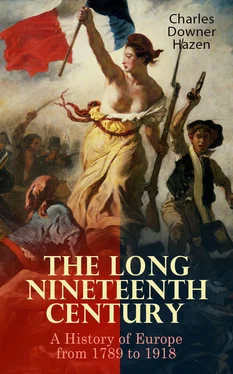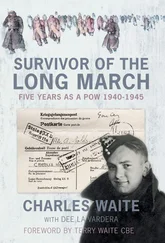But the third estate refused to verify until it should be decided that the three orders were to meet together in one indivisible assembly. This was a matter of life or death with it, or at least of power or impotence. Both sides stood firm, the government allowed things to drift, angry passions began to develop. Until organized the States-General could do no business, and no organization could be effected until this crucial question was settled. Week after week went by and the dangerous deadlock continued. Verification in common would mean the abandonment of the class system, voting by member and not by order, and the consequent preponderance of the third estate, which considered that it had the right to preponderate as representing over nine-tenths of the population. Fruitless attempts to win the two upper orders by inviting them to join the third estate were repeatedly made. Finally the third estate announced that on June 11 it would begin verification and the other orders were invited for the last time. Then the parish priests began to come over, sympathizing with the commoners rather than with the privileged class of their own order. Finally on June 17 the third estate took the momentous step of declaring itself the National Assembly, a distinctly revolutionary proceeding.
The King now, under pressure from the court, made a decision, highly unwise in itself and foolishly executed. When, on June 20, the members of the third estate went to their usual meeting place they found the entrance blocked by soldiers. They were told that there was to be a special royal session later and that the hall was closed in order that necessary arrangements might be made for it, a pretext as miserable as it was vain. What did this action mean? No one knew, but every one was apprehensive that it meant that the assembly itself, in which such earnest hopes had centered, was to be brought to an untimely end and the country plunged into greater misery than ever by the failure of the great experiment. For a moment the members were dismayed and utterly distracted. Then, as by a common impulse, they rushed to a neighboring building in a side street, which served as a tennis court. There a memorable session occurred, in the large, unfinished hall. Lifting their president, the distinguished astronomer, Bailly, to a table, the members surged about him, ready, it seemed, for extreme measures, There they took the famous Tennis Court Oath. All the deputies present, with one single exception, voted "never to separate, and to reassemble wherever circumstances shall require until the constitution of the kingdom shall be established."
On the 23d occurred the royal session on which the privileged classes counted. The King pronounced the recent acts of the third estate illegal and unconstitutional, and declared that the three orders should meet separately and verify their credentials. He rose and left the hall while outside the bugles sounded around his coach. The nobility, triumphant, withdrew from the hall; the clergy also. But in the center of the great chamber the third estate remained, in gloomy silence. This was one of the solemn, critical moments of history. Suddenly the master of ceremonies advanced, resplendent in his official costume. "You have heard the King's orders," he said. "His Majesty requests the deputies of the third estate to withdraw." Behind the grand master, at the door, soldiers were seen. Were they there to clear the hall? The King had given his orders. To leave the hall meant abandonment of all that the third estate stood for; to remain meant disobedience to the express commands of the King and probably severe punishment.
The occasion brought forth its man. Mirabeau, a noble whom his fellow nobles had refused to elect to the States-General and who had then been chosen by the third estate, now arose and advanced impetuously and imperiously toward the master of ceremonies, de Breze, and with thunderous voice exclaimed, "Go tell your master that we are here by the will of the people and that we shall not leave except at the point of the bayonet." Then on motion of Mirabeau it expressed by was voted that all persons who should lay violent hands on any members of the National Assembly would be "infamous and traitors to the nation and guilty of capital crime." De Breze reported the defiant eloquence to the King. All eyes were fixed upon the latter. Not knowing what to do he made a motion indicating weariness, then said: "They wish to remain, do they? Well, let them."
Two days later a majority of the clergy and a minority of the nobility came over to the Assembly. On June 27 the King commanded the nobility and clergy to sit with the third estate in a single assembly. Thus the question was finally settled, which should have been settled before the first meeting in May. The National Assembly was now complete. It immediately appointed a committee on the constitution. The National Assembly, accomplished by this fusion of the three estates, adopted the title Constituent Assembly because of the character of the work it had to do. No sooner was this crisis over than another began to develop.
A second attempt was made by the King, again inspired by the court, to suppress the Assembly or effectively to intimidate it, to regain the ground that had been lost. Considerable bodies of soldiers began to appear near Versailles and Paris. They were chiefly the foreign mercenaries, or the troops from frontier stations, supposedly less responsive to the popular emotions. On July 11 Necker and his colleagues, favorable to reform, were suddenly dismissed and Necker was ordered to leave the country immediately. What could all this mean but that reaction and repression were coming and that things were to be put back where they had been? The Assembly was in great danger, yet it possessed no physical force. What could it do if troops were sent against it?
The violent intervention of the city of Paris saved the day and gave the protection which the nation's representatives lacked, assuring their continuance. The storming of the Bastille was an incident which seized instantly the imagination of the world, and which was disfigured and transfigured by a mass of legends that sprang up on the very morrow of the event. The Bastille was a fortress commanding the eastern section of Paris. It was used as a state prison and had had many distinguished occupants, among others Voltaire and Mirabeau, thrown into it by lettres de cachet. It was an odious symbol of arbitrary government and it was also a strong fortress which these newly arriving troops might use. There was a large discontented and miserable class in Paris; also a lively band of radical or liberal men who were in favor of reform and were alarmed and indignant at every rumor that the Assembly on which such hopes were pinned was in danger. Paris was on the side of the Assembly, and when the news of the dismissal of Necker arrived it took fire. Rumors of the most alarming character spread rapidly. Popular meetings were addressed by impromptu and impassioned orators. The people began to pillage the shops where arms were to be found. Finally they attacked the Bastille and after a confused and bloody battle fortress was in their hands. They had lost about 200 men, killed or wounded. The crowd savagely murdered the commander of the fortress and several of the Swiss Guard. Though characterized by these and other acts of barbarism, nevertheless the seizure of the Bastille was everywhere regarded in France and abroad as the triumph of liberty. Enthusiasm was widespread. The Fourteenth of July was declared the national holiday and a new flag, the tricolor, the red, white, and blue, was adopted in place of the old white banner of the Bourbons, studded with the fleur-de-lis. At the same time, quite spontaneously, Paris gave itself a new form of municipal government, superseding the old royal form, and organized a new military force, the National Guard, which was destined to become famous. Three days later Louis XVI came to the capital and formally ratified these changes. Meanwhile similar changes were made all over France. Municipal governments on an elective basis and national guards were created everywhere in imitation of Paris. The movement extended to rural France. There the peasants, impatient that the Assembly had let two months go by without suppressing the feudal dues, took things into their own hands. They turned upon their oppressors and made a violent "war upon the chateaux," destroying the records of feudal dues if they could find them or if the owner gave them up; if not, frequently burning the chateaux themselves in order to burn the odious documents. Day after day in the closing week July, 1789, the destructive and incendiary process went on amid inevitable excesses and disorders. In this method feudalism was abolished - not legally but practically. It remained to be seen what the effect of this victory of the people would be upon the National Assembly.
Читать дальше












